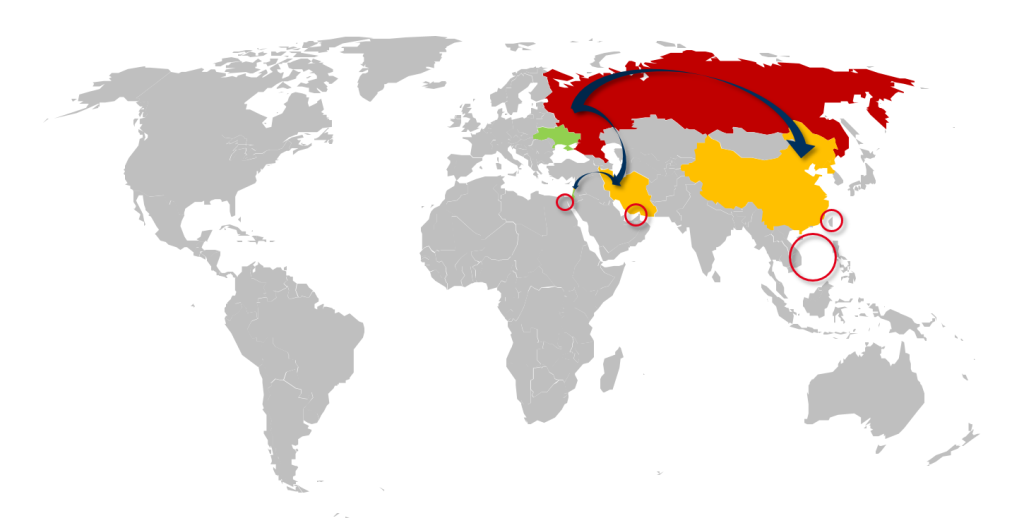Anyone looking for a clear and unambiguous definition of the term geopolitics will unfortunately not find a comprehensive description that can be clearly written down. However, the cornerstones of the historical development of the term do allow us to categorise it.
The first development of a field of knowledge that could be described as geopolitics emerged in the course of the great power endeavours of European colonial powers towards the end of the 19th century. In Germany in particular, imperial expansion and the expansion of the nation state through overseas colonies began during the euphoria of the founding of the German Empire in 1871.
To provide argumentative support at home and to justify the expansion, some of which was military, “Imperialist institutions and associations were formed in politics and society, whose propaganda […] was intended to convince voters that colonial expansion was in the general interest”.[1]
The focus was on explaining a foreign policy whose influence was characterised by the geography of a country and its impact on the social development of the state in the sense of an independent organism. In German-speaking countries, Friedrich Ratzel and Karl Haushofer were particularly prominent in this regard.
Pioneers of geopolitical thinking: Ratzel’s organic concept
Friedrich Ratzel (1844 -1904) was the first German-speaking author to attempt to develop a scientific method for geopolitics, which he derived from natural history and zoology. Ratzel asserted that “in the state, we are dealing with an organic being. But nothing contradicts the nature of the organic more than a rigid boundary.”[2] The seven laws established by Ratzel contain some natural laws with chauvinistic ideas, such as “the size of the state grows with its level of culture” or “the growth of a state takes place with the annexation of smaller entities by larger ones.”2 Since the organism is in competition with others, every large state with a growing population must claim more space in order to maintain its own civilised status[3], according to Ratzel. This spatialisation was then adopted and expanded by Karl Haushofer.
Expanding geopolitical horizons: Karl Haushofer’s contribution
With Karl Haushofer (1896 -1946), the discipline of geopolitics in Germany was given a concept of space and in which “geopolitics is the doctrine of the earthbound nature of political processes”[4], in which geopolitics is based on geography and the earth spaces associated with it. Haushofer attempted to use geopolitics to expand the geographically restricted German nation. He coined the term “Lebensraum” (living space), which was readily adopted by the National Socialist regime and accordingly misused ideologically and politically. Haushofer also wanted to embed geopolitics very strongly in a political system: “Geopolitics wants to and must become the geographical conscience of a state”[4].
Geopolitics in the shadow of the Second World War
After the horrors of the Second World War and the rule of the National Socialists, with the simultaneous abuse and utilisation of previous geopolitical definitions, not only did the term geopolitics fall into disrepute, but further research into the topic, at least in German-speaking countries, also largely fell silent. This was mainly due to the fact that a clear delimitation of the ideas of Ratzel and Haushofer did not take place even after the Second World War and the Nuremberg Trials.
Only in the USA and also in France was the academic discipline of geopolitics or geopolitique continued. In the 1970s, a new postmodern geopolitics developed in the USA, which still exists today.
Modern triggers: oil crises and the reassessment of geopolitics
According to Harvey[5], the trigger for a reassessment of geopolitics was the joint reduction in production quotas by the oil-producing countries (OPEC) during the two oil price crises in the 1970s, with the aim of achieving political but also, in particular, anti-Israeli goals.
The shift away from territorial expansion with an inside/national policy and outside/foreign policy in traditional geopolitics, towards a strongly networked society on many levels regarding transport, communication and goods transport, leads to an increased dependency and vulnerability of societies against any global risks that could disrupt the close networking.
Rethinking geopolitics in a risk society
In the 1980s, Beck[6] coined the term “risk society” for highly industrialised countries and their societies. In it, Beck describes a new form of modernity in which society attempts to cope with unknown and unforeseeable risks. For this risk society, which is borderless and global, existential dangers are no longer restricted by fixed boundaries due to complex networking. For this reason, the networking of society through physical and virtual lines in particular must be reflected in the definition of geopolitics.
Defining contemporary geopolitics: A multi-layered approach
From the perspective of postmodern geopolitics and the risk society, the following simplified definition of geopolitics can be used:
Geopolitics is the orientation of a nation’s foreign policy with regard to its own geography, the resources available and required within the borders of the nation state, and the cross-border transport routes for these resources.
How the foreign policy of a state is organised in detail depends on the political system of the state, its self-image and socio-cultural and religious orientation. It is also important to consider whether the state sees itself as a major global power or has the goal of moving in this direction. The goals of foreign policy also relate to energy and energy sources. It can therefore be confidently said that, regardless of a state’s political system, the aim of foreign policy is always to avert or minimise risk from its own nation state.
Sources:
[1] Georóid Ó Tuathail: Geopolitics – on the origins of a discipline in Geopolitics – Critical Geography 14; 2001, S. 9
[2] Friedrich Ratzel: The laws of the spatial growth of states in Petermann’s Geographical Notes 42, S. 97-107, 1896
[3] See: Friedrich Ratzel: Political geography, reprint of the third edition from 1923, Osnabrück 1974
[4] Haushofer, K., E. Obst, H.Lautensach, O. Maull: Geopolitics building blocks, Berlin 1928
[5] Harvey, D.: The Conditions of Postmodernity, Oxfort, Blackwell Publisher, 1989
[6] Beck, U. : Risk Society. On the way to a different modernity, Suhrkamp, Frankfurt a. M., 1986





What do you say on this subject? Discuss with us!